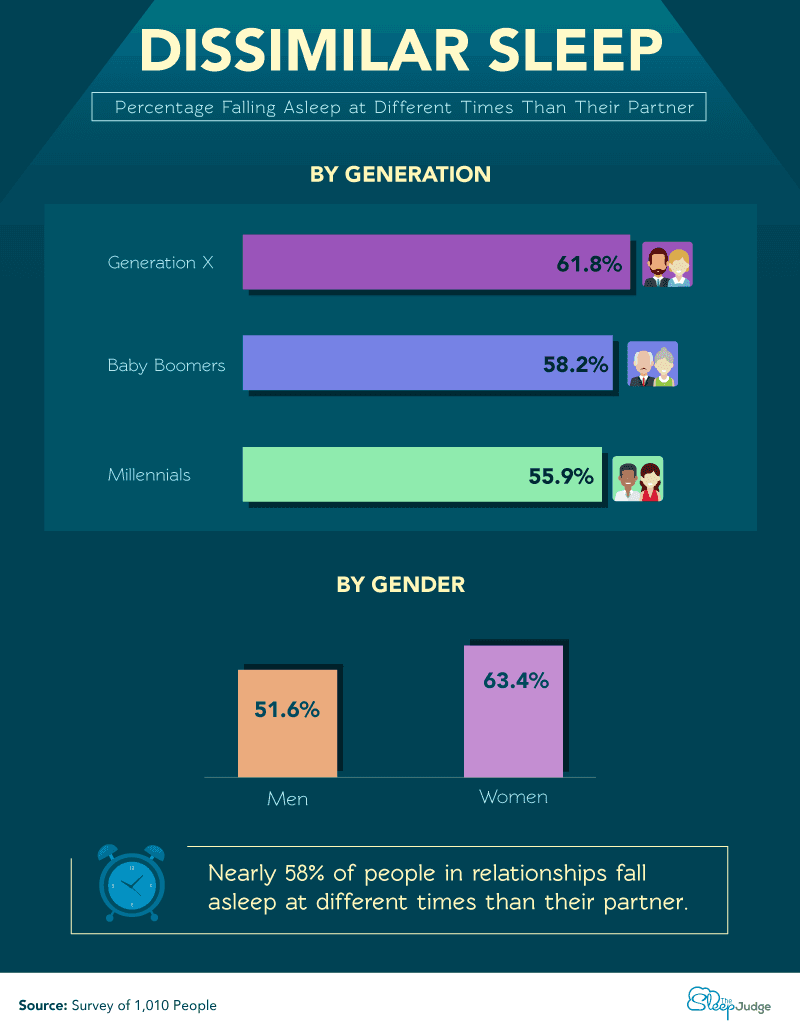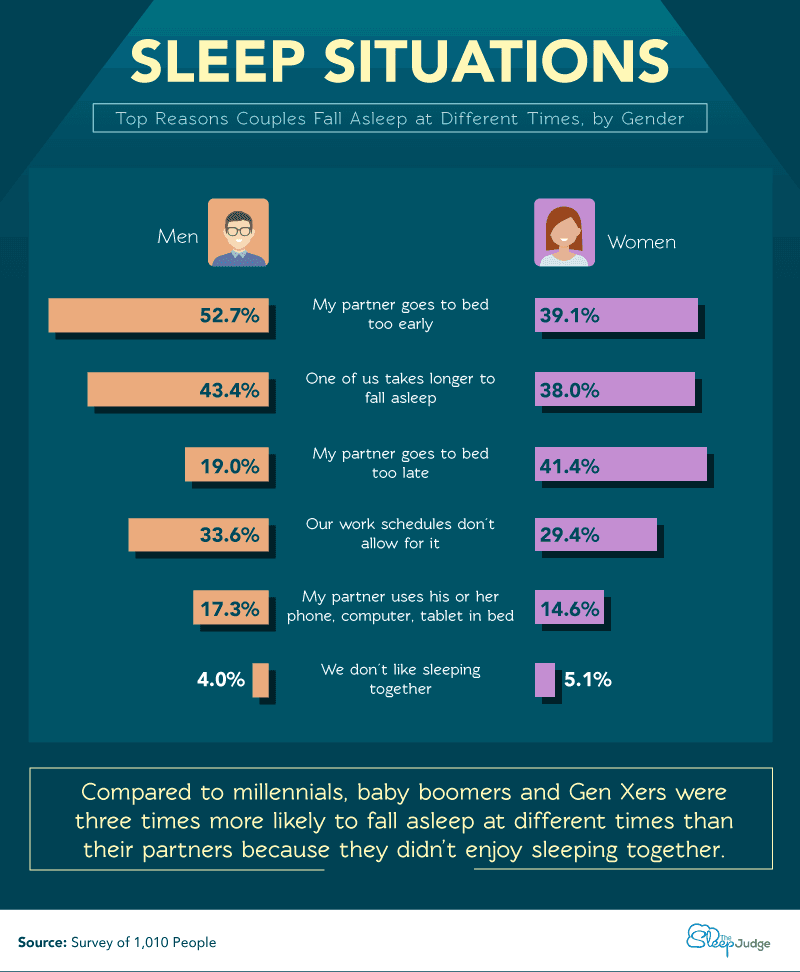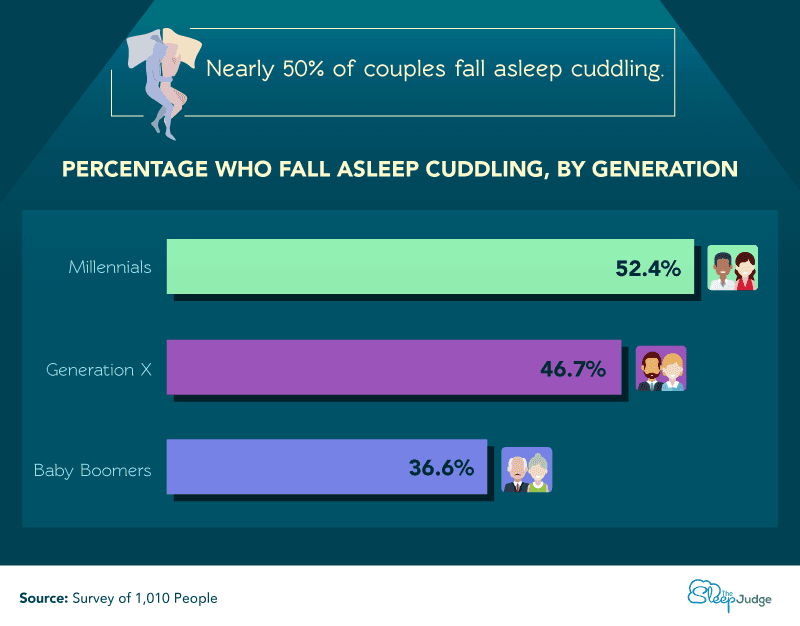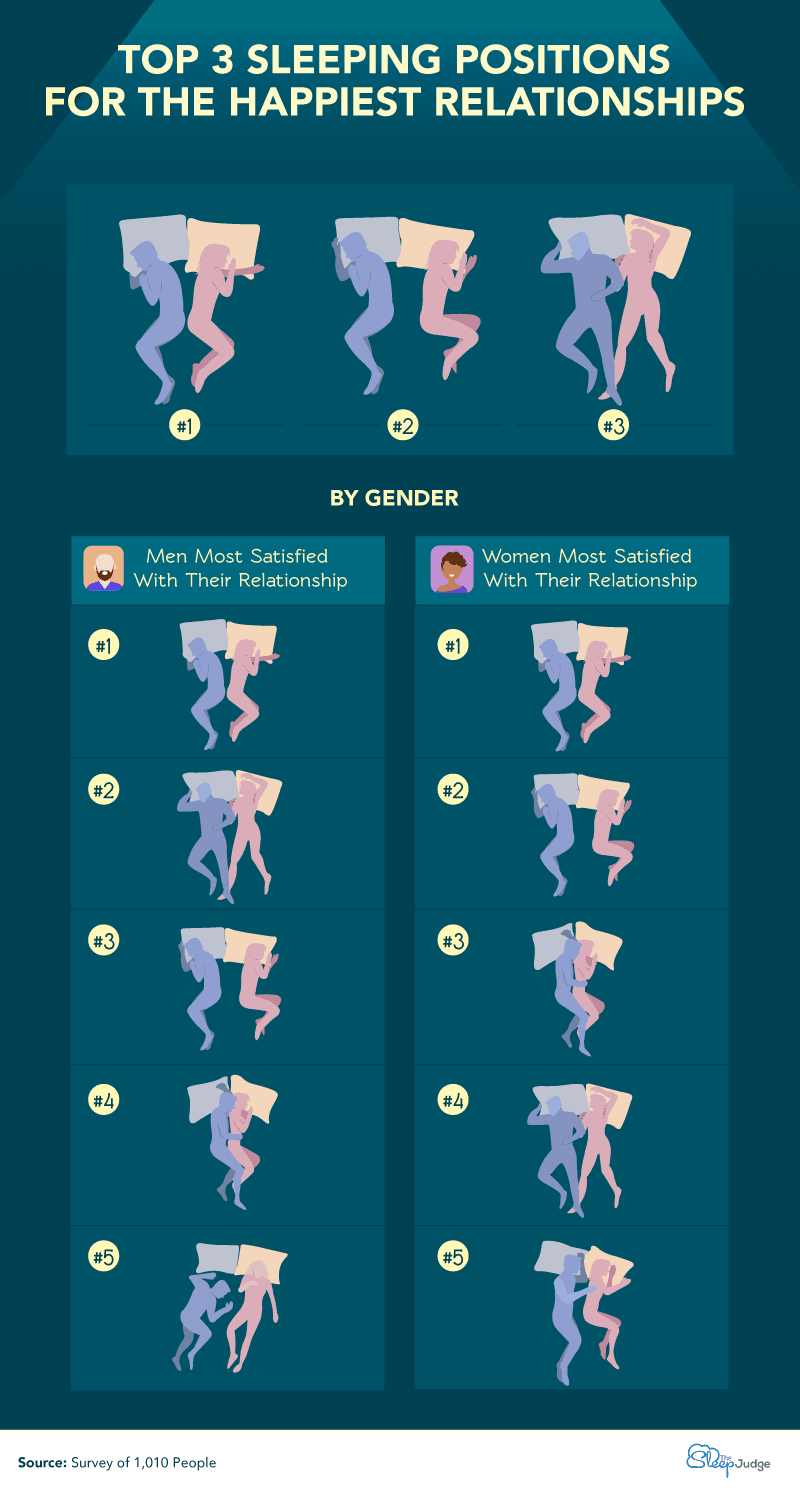Sleep “experts” have long debated whether being an early bird or a night owl helps make a person more successful or productive throughout the day, and even if the saying suggests fortune favors the early risers, that opinion may not hold up. In reality, research shows what time you go to bed and what time you wake up could be preprogrammed into your genetic makeup.
Marching to the beat of your own bedtime drum is one thing, but what do you do when your sleep schedule doesn’t fully line up with your significant other’s? Getting up before your partner and needing to tiptoe around the room to avoid waking them or needing to slide into bed at night without disturbing their sleep isn’t just tricky business, it can be a serious cramp in your relationship.
So how much does your sleep schedule affect the quality of your relationship? To find out, we polled over 1,000 people to learn more about their evening rituals and why they didn’t necessarily go to sleep together. Want to know whether you should start listing your bedtime in your dating profile? Read on to learn more.
To Each Their Own
Spend enough time dating someone, and you may start to realize you have even more in common. People in long-term relationships probably already realize that spending enough time with someone means picking up more of each other’s personalities. You might adopt each other’s speech patterns, food preferences, and even emotional responses. There’s one thing you probably won’t pick up, though: each other’s sleeping patterns.
Nearly 58 percent of people admitted they fell asleep at different times than their partner. Older couples might be more at peace with going to bed at the beat of their own drums. Nearly 62 percent of Gen Xers said they fell asleep at a different time than their significant other. Roughly 58 percent of baby boomers and 56 percent of millennials had a similar approach to picking a bedtime that worked for them, regardless of when their partner decided to hit the hay.
If anyone is less likely to adapt to their partner’s way of sleeping, it might be women. More than 63 percent of women, compared to less than 52 percent of men, refused to conform their bedtime schedule to their partner’s.
Meeting in the Middle
Trying to avoid disturbing your significant other when they’re falling asleep (or vice versa) can be quite the challenge. If couples are so worried about accidentally keeping each other up at night, you might be wondering why they don’t just adjust their sleeping schedules to be more in sync.
A majority of men (nearly 53 percent) preferred to stick to their own sleep routine due to their partner falling asleep too early. While more than 39 percent of women said the same thing, slightly more (over 41 percent) said their partner actually stayed up too late for their tastes.
While others suggested their partner took too long to fall asleep, sometimes it’s more than a picky bedtime that comes between couples. For nearly 34 percent of men and over 29 percent of women, conflicting work schedules kept them from harmonizing their sleeping habits.
Work may be the thing getting in the way of falling asleep next to each other, but our survey found couples who fell asleep at the same time were 22 percent more likely to be productive at work the next day. Whether that means a more restful sleep or less stress from not having to worry about waking each other up, linking your sleep schedules can be good for the time you spend apart too.
You might be interested in: The Best Soft Blankets for Lounging and Cuddling
Couples Who Cuddle
There’s another side of falling asleep together that could be beneficial for the time you’re awake: cuddling. Spooning, holding hands, or just wrapping an arm over a significant other releases a hormone in the brain that can boost your immune system, relieve pain, and deepen your emotional relationship.
Cuddling was more popular among younger respondents – more than half of millennials reported they fell asleep cuddling their partner, compared to nearly 47 percent of Gen Xers and almost 37 percent of baby boomers.
Good Vibrations
There’s no one perfect way to cuddle at night, but there are a few positions that could signify you’re in a happy relationship.
Side sleepers rejoice – lying butt to butt with your significant other doesn’t mean you don’t want to be close to each other; it was actually the cuddling position most associated with a happy relationship for both men and women. Men may be more likely to appreciate having a little extra legroom, though. According to male respondents, sleeping with just your ankles crossed or even further apart was a sign of a happy relationship. On the other side of the bed, women agreed that sleeping slightly further apart was best for them but also ranked being the “little spoon” as one of their favorite sleeping positions.
Like finding the right angle to get to sleep the quickest, trying to change what makes you comfortable at night may not be worth the fuss. A disconnect between the time you like to fall asleep at night, or the way you like to lay next to your partner, can lead to relationship rifts.
There may not be a significant difference in professional success between night owls and morning birds, but people who liked to stay up later were 22 percent more likely to get into arguments with their significant other than people who woke up earlier.
You may be interested in: Why Am I Waking Up at Night?
Better Sleep for a Better Tomorrow
No matter what time you like to go to bed, or whether you get up at the crack of dawn regardless of what time you need to be in the office, the amount of sleep you get at night is about more than waking up feeling relaxed or rejuvenated. Getting a quality night’s sleep on a regular basis will keep you healthier, happier, and more energized than anything else you can do for your body.
How you fall asleep with your significant other can have something to do with the quality of that rest. People who fell asleep together more often said they felt more productive at work the following day, and certain cuddling positions were more commonly linked with a happy relationship. It might not seem important in the beginning, but better sleep could mean an even better relationship in the long run.
Methodology
In this study, we surveyed 1,010 people currently in relationships through Amazon’s Mechanical Turk. Forty-five percent of respondents identified as female and 55 percent were male. The participants polled also ranged in age from 18 to 75 with a mean of 36 and a standard deviation of 11.2. Sleep positions that did not meet a minimum of 15 respondents were excluded from our findings.
Fair Use Statement
Ready for a little R & R? We’d love to see the results of our sleep study shared with your audience for any noncommercial use. Just make sure to include a link back to this page so that they can see our findings in their entirety.






